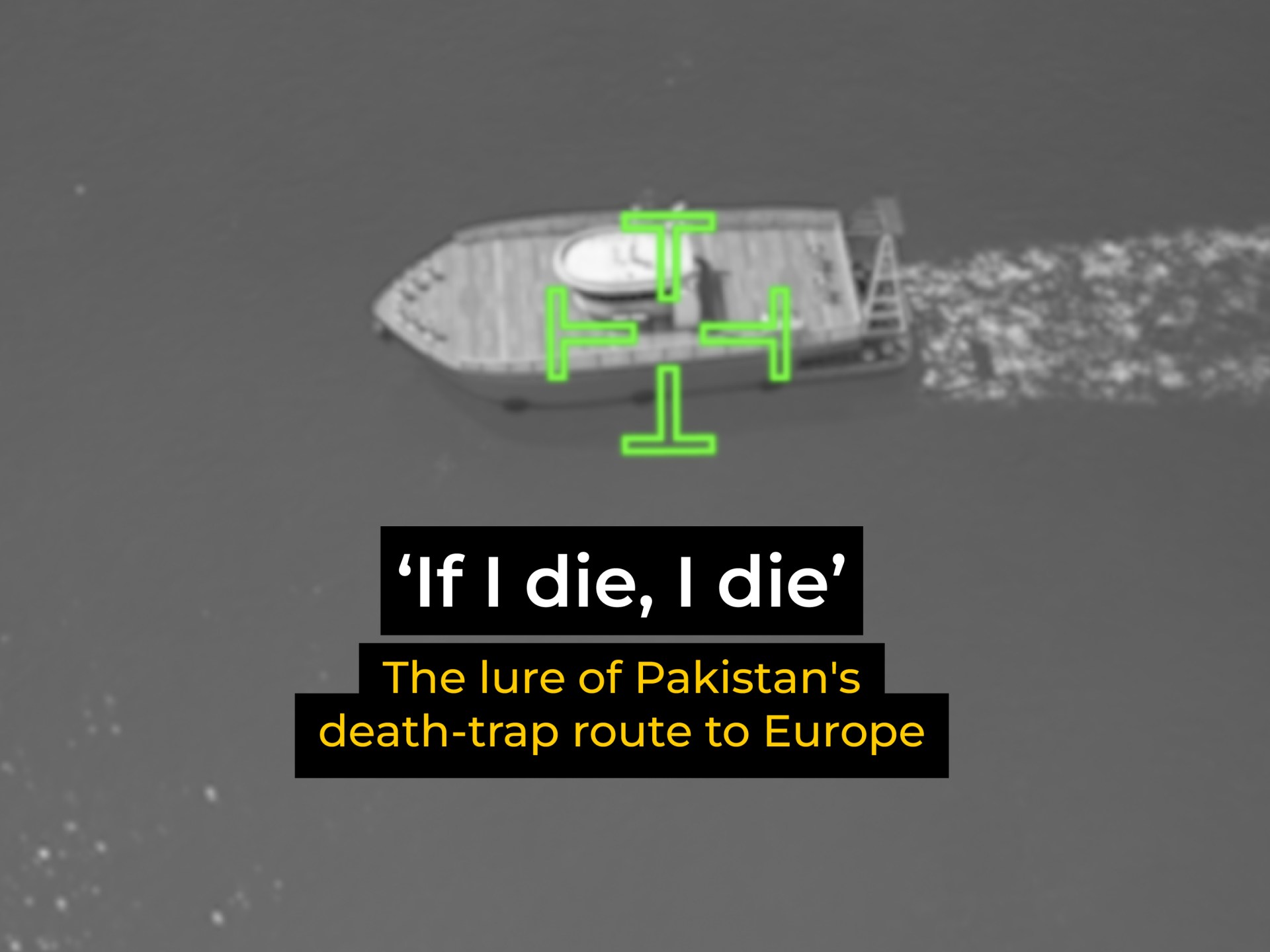A deadly dream, still alive
Hope also lives in Kalamata, Greece, where the survivors of the Adriana sinking were taken by rescuers to a temporary camp. Among them is 21-year-old Mehtab Ali, a resident of Mandi Bahauddin, a small city near Gujarat.
Mehtab plans to travel towards Athens: he is hopeful of receiving temporary documentation, which would allow him to work in Greece. Mehtab was also the last person who saw Haider alive, as the two jumped into the sea together as the boat capsized.
“I was on the second floor of the fish trawler, not on the top, and not locked downstairs. Many Pakistanis were on the top floor as well. It was all about who paid what,” he says, via a telephone call.
Mehtab corroborated accounts by many other survivors and the findings of other investigations that suggest that the ship was floating until the Greek coastguard tied a rope and pulled the vessel, which rocked the boat. As it capsized, those in rooms or on the lower floors couldn’t get out, but Mehtab, who knows how to swim, fell into the water. “I swam like I’ve never swum before,” he says.
To Mehtab, the risks have been worth it. Many of his friends have in the past taken the risky journey to reach Europe, but for Mehtab, leaving Pakistan was also a matter of life and death.
“I had to get out of Pakistan because I was caught in a complicated issue,” he says, referring to a family feud that threatened to turn deadly. “I was shot at twice, once in the leg, and once in the arm. I left to save my life. And I was unemployed, with no job and no way to make money. I thought it was best to leave and start over.”
It’s a sentiment that survives back in the village of Bandli, too.
Many residents there say they have no intentions to leave the country, or at least not go via Dunki and instead choose a legitimate, safe route.
But as Pakistan’s economic conditions continue to worsen, for a vast number of men — and they are always men — the lure of Europe far surpasses any risks that they may have to face. Moving within Pakistan, or even Middle Eastern countries, is not considered good enough any more, even if they don’t have to put their lives in peril.
As they see neighbours build new houses, buy big cars and climb the social ladder because members of their families have made it to Europe, the dreams of the next wave of Dunki travellers take firm root — even after losing friends and fellow villagers to boats capsizing in the Mediterranean.
Ans Sikander, 19, lost his cousin Awais Asif when the Adriana sank. The bespectacled Sikander says he was very close to Awais, who was two years older.
“You don’t always get along with all your cousins but Awais was different. There was only a little age difference, and we grew up together and would spend all the time with each other,” Ans says.
They would often speak about a lack of opportunities in their village, and how worried Awais was about the faltering health of his father, a labourer in the United Arab Emirates. After graduating from high school, Awais couldn’t get admission to the local university for two years — Ans claims officials asked for bribes. He also couldn’t find work in the village.
“We all often talked about attempting to take Dunki, knowing there is no hope for us.”
None of Awais’s friends or cousins attempted to deter him when he told them he was planning to make the trip to Europe.
“When he was planning to leave, we all just wished him luck and hoped he would succeed. Because he was going to chart a path for the rest of us who want to follow in his footsteps,” Ans says.
Ans, who finished high school in 2022, wants to become a mechanical engineer. But his applications for scholarships to study outside Pakistan haven’t been successful, and repeated visa rejections have left him cynical.
“It has been one year since I have been sitting at home wasting my time. The only way out is through Dunki, and I have started saving money for it with the help of my brother who works in England,” he says.
With two out of his 10 siblings already working outside Pakistan, Ans has role models within his own household. His father also used to work as a labourer in Saudi Arabia before returning to Bandli 12 years ago, where he runs a wood shop.
Ans is convinced that any pause in Dunki travel from the village will be temporary.
“You return here after six months, seven months. I am certain you will meet families who will tell you that their members are either collecting money for agents, or have already left,” he says.
His own father has been encouraging him to undertake the journey, suggesting that he try to get a visa to Turkey and then attempt Dunki to Greece or Italy.
“Look at me. I am doing well in my studies. I would like to stay but what opportunity do I have?” Ans says, his voice steady and matter of fact. “I don’t even have a functional, reliable internet which I could use to earn freelance income.
“What scope do I have here?”

Vikram Sharma is a globe-trotting journalist with a global perspective on international events. His articles offer readers a global perspective on international events, exploring complex geopolitical issues and providing insights into the world’s most pressing challenges.


